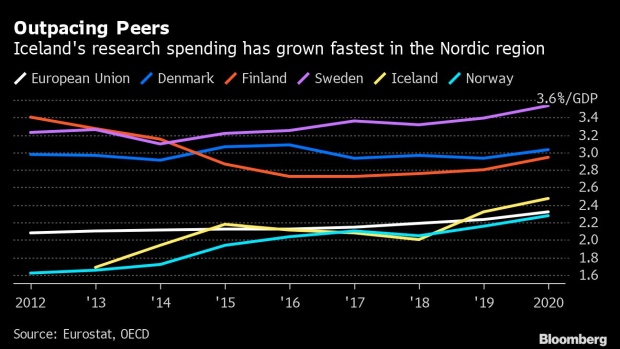Boom-to-Bust Past Inspires Iceland’s Push to Diversify Its Economy
, Bloomberg News

(Bloomberg) -- A part of Iceland’s economic future is growing inside a warehouse on the windswept Reykjanes peninsula in the southwestern corner of the volcanic island.
Not far from the capital Reykjavik, the unassuming white sheet-metal building is filled with rows and rows of transparent pipes, full of moss-green and brown liquid. The tubes, suspended on racks, are lit up in a multitude of colors with led lights to promote the growth of microalgae for extracting a valuable antioxidant called astaxanthin.
Tired of repeated booms and busts in its economy caused by individual sectors growing too big too fast, Iceland is making a concerted effort to diversify into new industries. Growing algae for nutritional supplements is just one of the businesses that have sprung up in recent years amid a drive by the government to promote innovation.
“The key to improved living standards and more opportunities is that innovation will become the biggest export sector in Iceland,” said Aslaug Arna Sigurbjornsdottir, minister of higher education, science and innovation.
The 31-year-old minister is keen to see the country move past repeated economic crashes, such as the 1969 collapse precipitated by a sudden disappearance of herring due to overfishing that sent the nation reeling. Or the 2008 financial crisis that toppled its banks, which had become nearly 12 times bigger than its economy. The most recent painful memory is the abrupt halt to travel in the wake of the pandemic.
“External shocks -- like when the herring vanished or when Covid put a stop to tourism -- will have a much greater long-term impact if we have all our eggs in the same basket,” Sigurbjornsdottir said in an interview.
It’s something the International Monetary Fund has also been calling attention to, saying in May that the multiple external shocks hitting Iceland underscore the need for further efforts to diversify the economy. The focus should be on improving competition, promoting innovation and easing rules on startups, the IMF said. The administrative burden on Icelandic startups is clearly above the level of Nordic peers and also exceeds the average among members of the Organization for Economic Cooperation and Development, the IMF said last month.
Iceland relies on aluminum smelters and fisheries for the bulk of its export revenue. The share of innovation and technology has recently grown as the pandemic hurt tourism in the land of glaciers and volcanoes.
At Algalif Iceland ehf., the microalgae grower, Head of Sales and Marketing Svavar Halldorsson said that early assistance from the government to get operations off the ground “absolutely helped” turn the company into what it is today: a profitable and growing R&D-focused business which foresees expanding sales to other industries beyond nutritional supplements.
Algalif has developed a way to cultivate the algae on an industrial scale on the cold North Atlantic island -- a far cry from the traditional method using shallow open ponds in sunlit countries close to the Equator. It’s in the process of building a new factory to scale up production.
“We are tripling our production and are going to be producing 100 tons of biomass, which gives us about 5,000 kilograms (11,000 pounds) of pure astaxanthin,” he said. That’s worth about $40 million.
In the government’s vision, innovation isn’t just a sector of its own, but something underpinning all industries, Sigurbjornsdottir said. It’s reimbursing companies for a share of their research and development costs, and allows individual investors a tax deduction of 75% of their investment in innovation companies, up to 15 million kronur.
It’s also vowed to make it easier and more flexible to hire “foreign specialists” and cut red tape in their immigration process. That’s to respond to the 80% of the country’s high tech and innovation companies saying they need more staff, according to a survey by the Federation of Icelandic Industries.
“We see a lot of opportunities ahead in gaming, IT development, biotech and health technology, and various other growth sectors, but a shortage of experienced professionals is impacting those industries,” said Sigridur Mogensen, director of creative industries at the federation. “It’s becoming a more pressing matter as each day passes,” she said, signaling the government isn’t acting fast enough.
Ivar Kristjansson, founder and chief executive of an indie games studio, 1939 Games ehf., agrees.
“Today the talent pool is still a little bit too small,” with about 500 people working in the country’s games industry, “and some solve that by hiring experts from abroad,” he said in an interview. His company hasn’t done that, but instead opted to open a second studio in Helsinki, where talent was more widely available.
“It’s great to start a company in Iceland but it can be challenging to scale up,” said the CEO, overseeing the development of a World War II themed digital collectible-card game.
The IMF also notes that digital-intensive sectors contribute less to value-added growth in Iceland than in other OECD countries, “suggesting that there is scope to widen digital penetration in the production process and increase the innovation potential in the economy.”
Alvotech SA, a biotech company that last month made history by becoming the first Icelandic company to have its shares traded both in the US and in its homeland, is set to be “one of the main generators of foreign currency to Iceland,” according to Chairman Robert Wessman, who founded the maker of so-called biosimilar drugs.
Read More: Alvotech Set to Become Biggest Icelandic Firm to List in US
“There’s been a lot of transfer of knowledge into the country” giving Iceland a “deep knowledge of biosimilars,” Wessman said. “We aren’t just building up a company, but also a new industry.”
©2022 Bloomberg L.P.
No comments:
Post a Comment